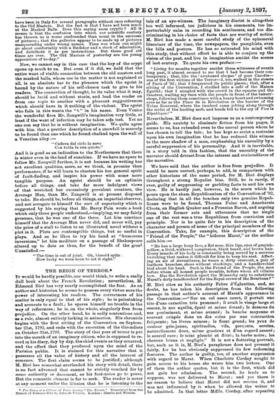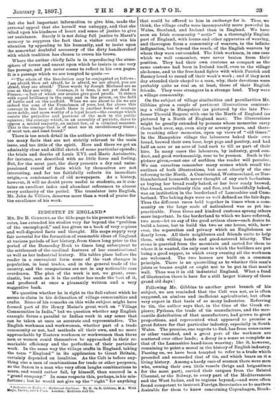THE REIGN OF TERROR.*
IT would be hardly possible, one would think, to write a really -dull book about the French Revolution ; nevertheless, M. Edmond Bird has very nearly accomplished the feat. As an author and historian he seems to possess every virtue save the power of interesting his readers. The correctness of his matter is only equal to that of his style ; he is painstaking and accurate to a fault ; he spares himself no trouble in the way of references ; he is, on the whole, singularly free from prejudice. On the other hand, he is sadly sententious and, as a rule, almost entirely lacking in animation. His chronicle begins with the first sitting of the Convention on Septem- ber 21st, 1792, and ends with the execution of the Girondists on October 31st, 1793. The story of that year of terror is put into the mouth of an imaginary citizen, who is supposed to re- -cord in his diary, day by day, the chief events as they occurred, and the effect that they produced upon the mind of the Parisian public. It is claimed for this narrative that it possesses all the value of history and all the interest of
• romance. The first claim seems to be justified ; although M. Bire has somewhat overloaded his story with detail, there is no fact advanced that cannot be strictly vouched for by • some authority or document, as his foot-notes go to prove. But the romantic element is far to seek. The reader is never at any moment under the illusion that he is listening to the
• The Diary of a Citirrn of Paris during " The Terror." Translated from the . Trench of Edmond fire by John de Villiers. London: (Matto and Wiudos.
tale of an eye-witness. The imaginary diarist is altogether too well informed, too judicious 'in his comments, too im- perturbably calm in recording his sentiments, and too dis- criminating in his choice of facts that are worthy of notice. M. Bird has made a most careful study of the ephemeral literature of the time, the newspapers, the pamphlets, even the bills and posters. He has so saturated his mind with this study, that without effort he is able to conjure up the vision of the past, and live in imagination amidst the scenes of last century. To quote his own preface :—
" Living for months together amidst these witnesses of events long past, it almost seemed to me that I had become their con- temporary; that, like the awakened sleeper' of poor Cazotte- one of the first victims of the Terror—I, too, walked in the streets of Paris of '93; that I frequented its public places ; that, after a sitting of the Convention, I strolled into a cafe of the Maison Egalite ; that I mingled with the crowd in the squares and the theatres, waiting my turn with the people in front of the bakers'- shops, following them sometimes with a heavy heart and swimming eyes as far as the Place de la Revolution or the barrier of the Trone Renverse, where the tumbrel came jolting along through the midst of the hooting mob, and heads fell to the cry of Vise is Republique ! "
Nevertheless, M. Biro does not impress us as a contemporary guide. His anxiety to eliminate fiction from his pages, it seems to us, has extended even to the unreal person whom he has chosen to tell the tale; he has kept so strict a restraint upon his own imagination that he has reduced this witness to the mere shadow of a man, emphasising his unreality by a careful suppression of his personality. And it is inevitable, in a story told in this fashion, that the unreality of the narrator should detract from the interest and vraisemblance of the narrative.
We have said that the author is free from prejudice. It would be more correct, perhaps, to add, in comparison with other historians of the same period, for M. Bire displays throughout a strong Royalist bias. Still, he is rarely, if ever, guilty of suppressing or garbling facts to suit his own view. He is hardly just, however, in the scorn which he pours upon the sham Republicanism of the Convention of '92, declaring that in all the benches only two genuine Repub- licans were to be found, Thomas Paine and Anacharsis Cloots, an English Quaker and a Prussian Baron, and arguing from their former acts and utterances that no single one of the rest was a true Republican from conviction and principle. Nor is he quite fair in his description of the character and person of some of the principal members of the Convention. Take, for example, this description of the "Friend of the People," the "hideous Marat," as the author calls him :—
" He has a large bony face, a fiat nose, thin lips, eyes of greyish- yellow, a livid, withered complexion, black beard, and brown hair. Every muscle of his body is constantly being moved by a nervous twitching that makes it difficult for him to keep his seat. Affect- ing an air of slovenliness, he wears a dirty overcoat, a pair of leathern breeches, shoes without stockings, and a handkerchief tied about his head. Such is the Friend of the People, the man before whom all honest people tremble, before whom all villains bow. Has the Revolution upset the Monarchy only to substitute Marat's dirty handkerchief for the Royal crown of the Bourbons ? "
M. Bird cites as his authority Fabre d'Eglantine, and, no doubt, he has taken his description from the following passage in that author's account of Marat's appearance in the Convention :—" Sur un col asses court, il portait tine tete d'une caractere tree prononce ; ii avait le visage large et osseux, le nez aquilin, dpate et meme ecrasd ; le dessous du
nez proeminent, et meme avance ; la bouche moyenne et sonvent crispee dans un des coins par une contraction frequente ; les levres minces ; le front grand; les yeux de couleur gris-jaune, spirituelles, vifs, percants, sereins, naturellement dour, meme gracieux et d'un regard assure; le sourcil rare ; le teint plombe et fietri ; Ia barbe noire; les cheveux bruns et negligds." It is not a flattering portrait, but, such as it is, M. Bird's paraphrase does not present it fairly, for he has obviously suppressed its few redeeming features. The author is guilty, too, of another suppression with regard to Marat When Charlotte Corday sought to gain access to his house she wrote him two letters. One of them the author quotes, but it is the first, which did not gain her admission. The second, he leads us to suppose, was not delivered to Marat ; and yet there is no reason to believe that Marat did not receive it, and was not influenced by it when be allowed the writer to be admitted. In that letter Mdlle. Corday, after repeating
hat she had important information to give him, made the personal appeal that she herself was unhappy, and that she relied upon his kindness of heart and sense of justice to give
aer assistance. Surely it is not doing full justice to Marat's memory to suppress the fact that a visitor could win his gttention by appealing to his humanity, and to insist upon the somewhat doubtful accessory of the dirty handkerchief with which tradition has chosen to crown his brows.
Where the author chiefly fails is in reproducing the atmo- iphere of terror and unrest upon which he insists in one very Eine passage, and yet never seems to reflect in his own pages. It is a passage which we are tempted to quote :—
"' The whole of the Revolution may be conjugated as follows : I am afraid, thou art afraid, he is afraid, we are afraid, you are afraid, they are afraid.' These words by Joseph Michaud are as true as they are witty. Courage, it is true, is not yet dead in France,—a fact of which our armies give good proofs. It shines with equal brilliancy in the camp and in the prison, on the field of battle and on the scaffold. When we are about to die we are indeed the sons of the Frenchmen of yore, but far above this courage in the face of death there is another form of courage more noble, and more worthy of a loyal heart—the courage which resists the prejudice and passions of the mob in the public squares; the courage which, in an assembly of patriots, dares to oppose a misled majority, an unjust law, or a criminal measure. This is the courage that is of most use in revolutionary times ; of most use, and least found."
There is too much detail in the author's picture of the time. too many facts that are not strictly relevant to the main issue, and too little of the spirit. Here and there we get an admirably clear and skilful sketch of some particular episode; the trials and deaths of Louis XVI. and Marie Antoinette, for instance, are described with no little force and feeling. But, for the most part, the diary presents a dry and unim- passioned record of facts which by themselves are not interesting, and far too faithfully reflects its immediate origin,—a condensation of old newspapers. As a history, however, it will no doubt prove useful to students, as it con-
tains an excellent index and abundant references to almost every authority of the period. The translator into English, Mr. John de Villiers, deserves more than a word of praise for the excellence of his work.















































 Previous page
Previous page